Anyone Have an Old Copy of a TLG CD?
At one time these texts were released on CDROM, but since 2001 these texts have been made available online to subscribing institutions and individuals. At SBTS, where I am studying, I have access to these texts online.
However, years ago we had the texts on CDROM. I even used the older CDROM version over a decade and a half ago for a paper that I wrote in my last semester for my M.Div. Recently, I tried to see if these CDROMs were still around because Accordance Bible Sotware includes the ability to directly import these ancient Greek texts and convert them into user modules for use in Accordance and in conjunction with other Accordance modules. Unfortunately, this only works with the CDROM modules, not the online texts as the underlying format has now changed. Anyone familiar with Accordance would recognize the value of having these texts available as modules over the limited ability to search and manipulate the texts online.
When I looked in SBTS’ library catalog, the TLG CDROMs are still listed. Unfortunately no one could find them. The discs were probably packed away in a box without proper acknowledgement in the database. I’m certain they will be unpacked in a hundred or so years and then summarily thrown away.
Therefore, I am sending out this request to anyone who might still have access to the old CDs so that I might obtain the texts in their original format to use them with Accordance.
To my knowledge, I am not doing anything illegal in asking to borrow these discs since my institution has/had copies of both the physical CDROMs as well as a current subscription to the online service.
New Journaling Bibles on the Horizon (HCSB, NRSV)
There are two new editions in the HCSB, called the HCSB Notetaker’s Bible, set for release very soon (October 8). One is referred to as a Men’s edition (ISBN 158640475X) and comes in a decorative brown hardcover. A women’s edition in mauve/olive green is also available (ISBN 1586404768).
There are no page spreads available for viewing yet, but these images of the covers are available at the CBD website (click on each image to see each Bible’s respective page):
Really, B&H should have probably avoided calling these “Men’s” and “Women’s” editions. I’m certain there will be some women who want the brown, and you never know who might want the other edition as well.
The CBD website also includes the following ad copy:
In an age when people can take notes using a variety of electronic media, there has emerged a countertrend whereby people want to journal in their won handwriting. The Notetaker's Bible features wide margins with subtle ruled lines, helpful center-column cross references, a concordance, and best of all, the largest point size among all Bibles of this kind. Handsomly bound for a man's taste. [The women’s edition says “Beautifully bound in with a woman's taste in mind.”]
Features include:
- The largest point size among Bibles of this kind
- Easy-to-navigate center-column references
- An easy-to-use concordance
- Ribbon marker
- Words of Jesus in red
- Translation footnotes, and exclusive HCSB bullet notes
Both Bibles measure 9.38 x 7.25 x 1 and contain 1280 pages. Biblical text will be presented in double columns. Personally, I feel that if a Bible of this sort uses double columns of text, there should be equal amounts of spacing for written notes for each column. We will have to see if B&H Publishing thought of this.
While I was on the CBD website, I also noticed an NRSV Notetaker’s Bible (ISBN 0195289226) to be released from Oxford University Press in 2009. There aren’t a lot of details yet, and no image that I could find even of the cover. But according to the CBD site the Bible will be paperback, contain 1296 pages, and measure 8 x 6.3 inches.
NLT: "Highway to Hell"
Sunday at church, our pastor referenced Matt 7:13 with the NIV text on the overhead screen:
“Enter through the narrow gate. For wide is the gate and broad is the road that leads to destruction, and many enter through it.”
Kathy, who refuses to carry anything other than the New Living Translation, nudged me to show me what her Bible said:
“You can enter God’s Kingdom only through the narrow gate. The highway to hell is broad, and its gate is wide for the many who choose the easy way.“
When the NLT was released in 1996, I spent the next year or so reading it cover to cover. It was unexpected renderings such as this that made me fall fall in love with the dynamic flavor of the NLT. I look at a rendering like “highway to hell” and at first it startles me, but then upon reflection I delight to realize that it absolutely carries the meaning of the phrase, ἡ ὁδὸς ἡ ἀπάγουσα εἰς τὴν ἀπώλειαν, into the contemporary vernacular in a clear and contemporary way.
I also appreciate the verses that employ the word “scum” (Matt 9:11; Mark 2:16; Luke 5:30).
The only problem with the NLT’s rendering of Matt 7:13? Now I have that AC/DC song playing in my head...
Quote for the Day #10 (Jerome)

“Ignorance of scripture is ignorance of Christ”
--Jerome
Referenced in “Singing the Blues with St. Jerome” at ChristianHistory.net.
More on Olive Tree's iPhone Bible Reader
Today, Steve Rogers (Captain America?) left a comment asking the following questions:
Will these bibles work with the iphone 3G? Are there plans to create an NIV and NLT versions for iphone 3G. Those are versions that I read.
Olive Tree’s Bible Reader works with any iPhone that has the 2.x software loaded, obviously including the iPhone 3G.
And yes, there are plans to release the NIV and NLT versions. In fact here are screenshots of these two translations from a beta version I have loaded on my iPhone:
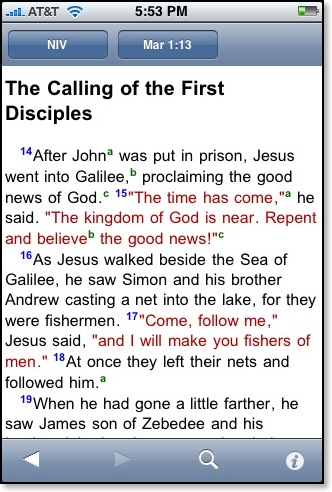
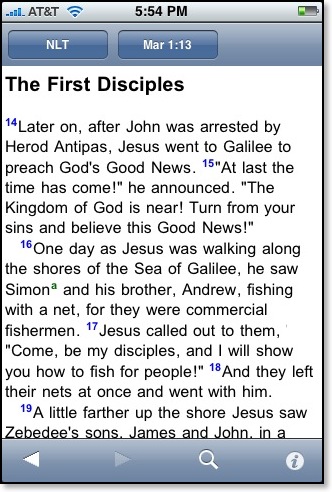
Note: Olive Tree does not require I sign an NDA for use of its beta, and I have been given permission to share any information about the beta including the images above.
TNIV Gate Keeper Profiles, Part 2
Dan Masshardt, Pastor
New Cumberland, Pennsylvania
I had been a fairly consistent NIV user since High School, although I have always utilized other translations. Then two years ago my seminary gave a hardcover copy of the TNIV to students from the publisher. I was quickly hooked and it has been my translation of choice ever since.
I pastor a medium sized church and now use the TNIV for all of my public teaching and preaching as well as my primary Bible for study. I listen to the TNIV in my car and at home on CD as well. There are both practical and intellectual reasons for liking the TNIV so much.
Practically, it is similar enough to the NIV that so many people still using that translation don’t feel lost when I read and teach from the TNIV. Also the “gender accurate” language means that I do not constantly have to explain that “this applies to women too.” The translation is easy to read and understand what is being communicated. The challenge is now in interpretation and understanding the content of the message, not working through wooden or outdated language.
While some may not notice, it is helpful to look into many of the updates made to the NIV translation and see that now we have even more accuracy than before. Enhanced accuracy in a package that is highly readable is tough to beat.
For these reasons and others, I enthusiastically recommend the TNIV to friends and members of our congregation. I love the Reference Bible personally, but will recommend the TNIV Study Bible as well as the audio format for a long time to come. Thanks to the translators and publishers for all their hard work to serve the Church!
Greg Cohoon, Sunday School Teacher
Mount Pisgah United Methodist Church
Greensboro, North Carolina
I have been teaching an adult Sunday School class at my church for the past 4 or 5 years. It's a class that I "inherited" when the previous teacher moved. The class was formed about 15 years ago out of a desire for adults to have a class for in-depth Bible Study and developed along the lines of simply going through the Bible verse by verse, starting in Genesis. We typically cover about a chapter per week. The structure of the class is a hybrid lecture/discussion, where I encourage class participants to share insights they have about the particular passage being studied. In addition to encouraging and guiding discussion, I provide lecture on various aspects related to the passage: historical information, literary form of the passage, simple word studies, etc. The resulting mix is a somewhat scholarly treatment of the material, with discussion of how the truths revealed in each passage are applicable in our daily lives. When I started teaching, the class was near the end of 2 Chronicles. We are currently in the middle of Isaiah. I like to joke that we are working through a 75-year reading plan.
I don't precisely remember how I discovered the TNIV. I suspect that I discovered it as a module in my Accordance Bible Software. I rely on that software heavily to prepare my Sunday School lessons, as it allows me to easily compare different translations as well as have a huge wealth of study tools available for preparing my lessons. I'm a firm believer that all Bible translations are imperfect, so I greatly appreciate the ability to compare a variety of translations when studying and teaching. The most popular translation in my class is the NIV, so using the TNIV when teaching was a natural choice that would sound familiar to my students as well as being different enough to remind us that we are studying from a translation. I currently use several translations in class, with the TNIV and ESV being the two I use most often. It's always exciting and interesting when translation differences help spark a deeper study of the particular passage being examined. I like that by exposing the class to various translations, it gives us an opportunity to discuss translation philosophies and engage in simple word studies on a regular basis. I especially like that by using the TNIV, I am able to present a translation that is very familiar to my class, while introducing a fresh take.
I mentioned my use of Accordance Bible Software in my preparation. While it is very convenient to have a powerful computer program to assist in preparation, I've still found that nothing beats actually holding a book and turning the pages for studying God's word. In class, I always read the text from a Bible, not from a computer. I'm really looking forward to being able to incorporate this nice Bible into my teaching routine.
Feel free to interact with Dan and Greg in the comments.
Other Posts:
Part 1
Part 3
After the Fact: Reflections Upon The Dark Knight

I grew up reading comic books, transported away to a land of super heroes and super villains. I don’t buy comic books anymore except perhaps a rare purchase of a graphic novel or a collection of stories that have received acclaim. But even to this day, in any life or death situations I might find myself in, I often ask “WWBD?” (What would Batman do?).
The Dark Knight was one of the most intense super hero movies I’ve seen to date, and while I am not going to write a review this far after the fact, I thought I would offer a few thoughts for conversation now that I’ve been able to reflect upon the movie.
- This was the first Batman movie to not have the name “Batman” in the title. I was very pleased with the title itself, The Dark Knight, because it sets the stage to one day produce a movie based on Frank Miller’s graphic novel The Dark Knight Returns. If you aren’t familiar with Returns, this is the story of an aged Batman who, with the help of technology comes out of retirement to face old foes and his own mortality. People often point to Frank Miller as the greatest influence on the Batman stories that have been told since 1989; however, I would suggest that Miller was building upon the Batman from the Denny Miller and Neal Adams stories of the seventies. Miller and O’Neal singlehandedly rescued Batman from the camp of the 60’s television show and took the character back to his darker roots. To this day, Adams may still be my favorite comic book artist of all time. I would hope that Warner Bros wouldn’t wait 20 to 30 years for Christian Bale to get older for a Returns movie, but I’m not certain who would play an aged Bruce Wayne right now among current Hollywood actors. In ten years George Clooney would be a good pick if it weren’t for the fact that he’s actually played Batman and the movie was absolutely horrid.
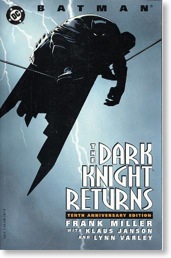
- Heath Ledger was magnificent as the Joker. His tragic death at such a young age is, indeed, an incredibly unfortunate turn of events. To say what I’m going to say next would have been deemed insensitive a few months ago, but perhaps now we can ponder where his death leaves us in regard to the current film series. My long complaint against superhero movies is how often a villain is killed off at the end. Comic books, which have to produce multiple stories around the main characters every year can never afford to kill off villains. They have to return by the nature of the medium. Contrary to the ending of 1989’s Batman, in The Dark Knight, the Joker actually lives to face his nemesis another day. There was even dialogue in the movie about how much the two characters needed each other. I’d heard rumors that originally there was discussion that the next movie might be loosely adapted from The Trial of the Joker. But now with not only Ledger’s death, but with Ledger’s magnificent performance we probably won’t see the Joker again until the series is rebooted yet again in 15 to 20 years. My friend Rob Carson suggested to me that if anyone could take over the reigns of the Joker, it might be Johnny Depp. However,
now it’s been confirmedrumor has it that Johnny Depp may play the Riddler in the next movie.
- Christian Bale makes for an excellent Batman (although I think his voice became too gravelly near the end of the movie, making him hard to understand). However, I think he could do better with his portrayal of Bruce Wayne. Few characters in comic books are as complex psychologically as Bruce Wayne. On one hand he has to portray himself as the millionaire (now billionaire) apathetic playboy, yet in reality from a psychological standpoint, he’s slightly batty (pun intended) himself. Batman is a bit on edge (and much meaner than Superman) because he’s not quite right in the head as Bruce Wayne. And he’s not quite right in the head as Bruce Wayne because he has to dress up as a giant bat every night. Michael Keaton wasn’t as good of a Batman, but he may have been a better Bruce Wayne.
- Speaking of the psychology of these characters, I believe that Harvey Dent/Two Face got a bit short changed (another pun, but I’m stretching it this time in regard to his silver dollar). Actor Aaron Eckhart said that he actually studied split personalities in preparation for the role, but really there’s not much in the script for him to make use of this background. In the comic books, Two Face actually has a split personality. At one moment, he might be able to talk to someone rationally as Harvey Dent, but then in the next, he flips a coin and kills the person in cold blood as Two Face. I originally thought they were building the Harvey Dent character up for the next movie, and I really feel his short time as Two Face was wasted. My biggest gripe about most superhero movies is that they try to do too much. They fit in two bad guys when it would be much better to just focus on the one. I really wish that the Joker had been the main antagonist in this movie and perhaps Two Face in the next or even the one after. By the way, if Two Face was underdeveloped for this movie, that means by necessity that killing off the Rachel Dawes character was a bit of a waste as well.

- Did you notice that the director went out of the way to never show the face of Commissioner Gordon’s daughter? Contrary to the awful Batman and Robin of 1997, Batgirl is not Alfred’s niece but rather Commissioner Gordon’s daughter, Barbara Gordon. Evidently, the PTB did not want anyone’s face associated with Barbara Gordon/Batgirl this early in the stories.
- Personally I thought the ending of the movie was a bit convoluted. So...Gotham needs a hero besides Batman to look to, even if it’s not true? Why did Batman have to take the blame for Dent’s death? Why couldn’t it have simply been made known that the Joker was at fault but that Batman had beat the Joker? And ultimately, does that mean that the Joker, in his desire for anarchy and chaos simply for their own sake, ultimately won? Now granted, many movie trilogies present a middle story with a somber climax (Empire Strikes Back, Back to the Future II, The Two Towers, etc.) so that the final victory in the third part is magnified. However, knowing that the script for the third movie isn’t written yet, I have doubts that Christopher Nolan and company have that solid of an overaching plan. I don’t believe we are going to see the unity of subplots that we saw in Sam Raimi’s Spider-Man trilogy in these movies, especially with the death of Rachel, but that’s not necessarily their goal either. They may simply desire to create a series of movies that focus on the character more than the events in the character’s life--much like way the James Bond movies have traditionally been made.
In my previous post, I mentioned my friend Andrew who died in 2006. His favorite Batman movie had been the much darker Batman Returns (1992). I wish I knew what he thought of The Dark Knight. His interpretation of the style and plot points would have been interesting to hear.

Personally, I think it would be a mistake to go to too radical of a revision (say a cyborg Superman or a Superman with long hair and sunglasses as they’ve done at times in the comic books). A radical revision would drive away the moderate fans who just want to see Superman in action.
However, after watching the two most recent 8th season episodes of Smallville, I have to think it would be a shame if Tom Welling never gets to actually don the costume. I believe that if the PTB at Warner Bros were smart, they’d cap off this final season of the television show and immediately launch Welling into the full blown Superman role. They could keep the continuity of the television show for a series of movies. For what it’s worth, Welling is actually older than Brandon Routh who portrayed Superman in the most recent movie.
Political Ponderings

I should also point out that some of my bias against politics may also come from having grown up in Louisiana which does not have the cleanest of reputations when it comes to politics. I definitely have a trust issue with most politicians. I guess that’s a prejudice I need to work on.
In Romans 12:18 Paul writes “If it is possible, as far as it depends on you, live at peace with everyone” (TNIV).
Politics really makes this difficult. Take for instance my own very minor foray into politics this year. I’m president of my homeowners association. I did not want to run, but I was asked to run, and I did so with the intent of trying to help my neighbors. But then ethics (of all things) got in the way. And in trying to do the right thing in a handful of situations, I have for the first time in my adult life (or at least back as far as 7th grade) a handful of people who just hate my guts. There’s no reasoning with them. There’s no laying my gift at the altar to be reconciled with them (Matt 5:23-24). And I can forget inviting them to church or being any kind of witness for Christ to them. This small number of people--who happen to be my literal neighbors--wouldn’t give me the time of day.
Needless to say, I won’t be running again in February when we hold new elections.
Currently, there’s a group of ministers challenging the IRS’ regulations regarding pulpit endorsements (see Christianity Today: “Endorsing from the Pulpit”). I can’t say strongly enough how great a mistake this is. Christ did not call ministers to win political debates; he called them to proclaim the gospel and make disciples. The moment a minister endorses a candidate or publicly backs a political party, a certain segment of the populace--those who are of the other party or back the other candidate--will no longer listen to any appeal from that person to answer the call of the gospel. And all this over something which in the big picture is a tangental/secondary issue. In the end, the calling to ministry must trump one’s own political convictions and even national allegiances.
I’m not currently on a church staff, but at times whether I’m on one or not, you will never see a political sign in my front yard (if I had a front yard) or a candidate’s name on the bumper of my car. I know that the moment I back a candidate, I’ve lost any potential Christian witness with anyone on the other side. That’s my conviction; I’m not saying it’s prescriptive for you. I’m not going to do anything to mix those messages.

I’ll be honest though--I used to be a Republican. But I was strongly turned off to any association with political parties in the late nineties when a particular individual of one party committed a seriously heinous act. The act was bad enough by itself, but I watched in disgust as his political enemies of the other party went after him in an entirely inappropriate manner. It was their rhetoric and their hypocrisy (I assure you that I’m making correct use of that word here) that was my final straw. In the end I decided to have no affiliation with either Republicans or Democrats.
You stay with your convictions, and I won’t try to convince you otherwise, but out of my own convictions, I’m “none of the above”--I’m registered as an Independent. I occasionally run across someone who mistakenly believes that there is an “Independent Party.” That’s not the case, but if there ever is one, I will have to register as something else all over again.
And forgive me for over-spiritualizing the subject, but there were political parties in Jesus’ day and he did not choose affiliation with any of them either. That alone is worth some time spent in contemplation.

In regard to this year’s election, I’m part of that 15-20% “undecided” group you keep hearing about on television. I’ll tell you up front that in the past I’ve primarily voted fairly conservatively, often for the Republicans. And often this has been based on trying to wrap my conscience around voting for someone who does not claim to be pro-life at some level. However, at the same time, I strongly resent having the choice of my vote reduced to that one issue (and maybe one or two more). Plus, I feel a bit used by the politicians on the right who make this an issue only at election time and ignore it during the four intervening years. It makes me wonder if I should even let this become an issue since it hasn’t overtly seemed to matter one way or another after the election is over anyway.
I wish my friend Andrew was still with us, because although morally conservative, he had the political acumen to put the emotional, rhetorical and manipulative issues aside when choosing a candidate. I miss not being able to hash through some of the issues this political season with him.
I have to consider a number of other issues affecting our world today. Although the war in Afghanistan made logical sense, I never felt the same way about the war in Iraq. When the US made the decision to invade Iraq, I said at the time in the classroom (I was teaching high school then) that I felt this conflict met no criteria of classical “Just War” theory in any sense. And I still feel the same way. I voted for Bush twice, so I believe I have the right to be critical of him, but I believe he’s turned into a bit of a warmonger, and that’s not what I want in a president.
Our troops are undeniably stretched too thin with current involvements. We are not in a position to police the world, and we are spending money to the neglect of our own immediate needs and incurring a debt that will take decades to pay off.
By way of illustration, where my convictions are solidly more left-leaning has to do with health care. We have far too many people going without needed medical treatment in our country today and frankly, it’s shameful. There’s an individual in my family who, although he makes a decent living, works hard with two jobs, cannot afford health insurance. Because he’s diabetic, his insurance would cost over $800 a month and he simply can’t afford it. He often opts not to go to the doctor when any normal person would because he cannot afford it. When an illness becomes serious enough and he has no other choice, he often has to barter goods and services for his payment. This embarrasses him and it puts his doctor in an awkward position. He is one medical emergency away from a severe personal and financial crisis. I can also point to people I know in my church who have not been able to afford medicine their doctors had prescribed for serious ailments. Members in our church have been able to help some, but this isn’t a solution for the nation.
If the United States were a third world country (current economic crisis aside), I might feel differently, but I really believe that no one in our country should go without healthcare. And if we can spend $10 billion each month in Iraq, one would think we could spend significantly less to take care of those who are unable to afford decent medical treatment.
I also want a president who is going to take our environment seriously. In the end, global warming may become the ultimate “pro-life” issue, but too many people are not willing to take it seriously. By the time they do, it may be too late. It may already be too late if recent concerns are warranted.
Education policy is another hot button issue for me. I used to teach high school and my wife currently teaches in a public elementary school. I challenge you to quickly find any public school teacher who has been supportive of Bush’s “No Child Left Behind” policy. It sounded good in presentation, but it’s been a joke and a disaster in implementation. It actually penalizes schools that often need the most help. I’m very interested to hear the plans of both candidates on this subject, but most teachers hope that the next presidency--regardless of who wins--will bring an end to the current education policy.
Understand I’m not giving either candidate the actual label evil, but for me this election may come down to choosing the lesser of two.

In our modern media driven era, the prettiest candidate wins (and no, I’m not referring to Palin). What this means is that in our media-driven culture, the candidate with the most charisma, the one who comes across best on television always has the advantage. One of my political science teachers in college twenty years ago pointed this out and I still believe he’s right. He pointed to the first televised presidential debate in 1960 between John F. Kennedy and Richard M. Nixon. Kennedy came across as young, calm, and relaxed while Nixon seemed uncomfortable, a bit nervous, and was sporting a very real 5 o’clock shadow. Kennedy’s supposed advantage had nothing to do with the content of their arguments. In fact, from what I’ve read, people who listened to the debate on the radio thought that Nixon won. But people who saw the debate on television thought that Kennedy won.
And guess which medium rules our day? I’ve even heard some speculate that if Lincoln and Douglas had been holding their debates today, there’s no way Lincoln would win because he was not all that charismatic in person. But in their day, more people read the debates than saw them in person.
Think about candidate pairings in the past: Carter vs. Ford, Reagan vs. Carter, Reagan vs. Mondale, Bush vs. Dukakis, Clinton vs. Bush, Clinton vs. Dole. In any of these pairings it’s easy to pick which of the two had more charisma and which looked better on TV--and that person won. Where we’ve had very close elections, we’ve seen pairings in which neither individual necessarily trumped the other when it came to charisma or presence on television (Bush vs. Gore and Bush vs. Kerry).
I’m not sure the GOP always understands this. For Republicans, it seems that a politician can “earn his turn” to run. This happened with Bob Dole. I liked Dole and I voted for him, but I knew even then he was not going to beat Clinton. And now it’s McCain’s “turn” because he’s at an age where it’s now or never. However, if Republicans had been better in tune with the power of media, someone like Mitt Romney would have had a much better shot at beating Barak Obama than John McCain ever will.
Barak Obama is not the most charismatic candidate to come along in recent years, but he has charisma nonetheless, and he’s well spoken. McCain comes across as stiff and fidgety, and often looks like he’s wearing the wrong size sport coat. I can certainly see why he’s trying to stall on the debates because even if he were to present a platform that was more sound, the visual appearance of the event will undoubtedly give the nod to Obama.
Both candidates chose running mates that were the opposite of the negative impressions people had of them. But in the end the vice presidential candidates don’t make final impression in the minds of the people. And contrary to what some people are saying, Hillary Clinton backers are not going to support McCain simply because he has a woman as his running mate. Hillary Clinton has more in common with Barak Obama than with Sarah Palin; and so for most of them, it will also be a “lesser of two evils” decision.
Finally, polls don’t amount to much. Polls are the record of a small amount of people who were willing to answer the pollster--which is not a lot of people. If you call my parents’ house to ask them who they are going to vote for, get ready for a lecture on how voting is private and that’s none of your business. If you call me... well you can’t call me because I only have a cell phone and that number’s unlisted. And if you did reach me to take a poll, I’d probably tell you I’m too busy.
I really am undecided as to who I will vote for. I signed up for updates on both candidates websites--something I’ve never done before, and it’s been interesting to have them both vying for my attention. Both send me emails. Obama sends me text messages to my iPhone; McCain sends me stuff in the postal mail. If I were to vote for Obama, it would be the first time I’ve ever voted for a Democrat for president. But I also admit that I could still vote for McCain based on certain moral positions.
On the other hand, I could always vote for McCain for the sake of conscience, knowing full well that Barak Obama is going to win anyway.
All of the images in this post were shamelessly lifted from other websites.
Test Your View of the NT Use of the OT
You can see my results below. Feel free to take the quiz yourself. Post your results in the comments or a link to your blog if you post your results there.
| NT Use of the OT -- Test Your View! |
| Fuller Meaning, Single Goal view You seem to be most closely aligned with the Fuller Meaning, Single Goal view, a view defended by Peter Enns in the book "Three Views on the New Testament Use of the Old Testament" (edited by Kenneth Berding and Jonathan Lunde, Nov. 2008). Since the NT writers held a single-minded conviction that the Scriptures point to and are fulfilled in Christ, this view suggests that the NT writers perceive this meaning in OT texts, even when their OT authors did not have that meaning in mind when they wrote. It should be noted, however, that advocates of this view are careful not to deny the importance of the grammatical-historical study of the OT text so as to understand the OT authors on their own terms. For more info, see the book, or attend a special session devoted to the topic at the ETS Annual Meeting in Providence, RI (Nov. 2008); Walter C. Kaiser Jr., Darrell L. Bock, and Peter Enns will all present their views. |
Fun quizzes, surveys & blog quizzes by  |
Are We Nearing a Full Blown Depression?
“O that my head were a spring of water,
and my eyes a fountain of tears,
so that I might weep day and night
for the slain of my poor people!”
(Jer 9:1 NRSV)
Housing bust, record foreclosures, out of control gas prices, job losses, major financial institutions going under. Really, in my 40 years I’ve never seen anything like it. This was a topic of discussion with my students before our class last night, and I made the statement, “It seems as if we’re nearing a full blown depression.”
Very quickly, one of my students shot back, “Well, you’re the only one to admit it!”
When I asked her what she meant, she said, “All of the politicians on television refuse to even admit that we’re in a recession when everyone knows we are.”
She’s right of course. This election year I’ve been on the email lists of both Barak Obama and John McCain. Obama sent out an email today referring to the situation as “our financial crisis.” Yesterday, McCain referred to “these tough times.” Bush says we’re in the middle of an “economic slow down.” No one wants to use the “R” word and certainly not the “D” word. This is an election year, after all.
The New Oxford American Dictionary defines recession as “a period of temporary economic decline during which trade and industrial activity are reduced, generally identified by a fall in GDP in two successive quarters” (a depression is simply defined as “a long and severe recession in an economy or market” ). So I don’t know if the situation meets this actual criteria but I know times are difficult economically, and I don’t yet see any indication that the immediate future is brighter. I’m generally not a doom-and-gloomer, but I really believe we should be prepared for potentially worse days ahead.
Flipping through the pages of the Renovaré Spiritual Formation Bible, my eyes happened to stop on the note accompanying Jeremiah 9:1. As you read the words below substitute in your mind the word politicians in place of kings.
“Grief is a prophetic activity. Kings put a happy face on everything, tell the people this is the best of all possible worlds and they never had it so good. It takes a truthful prophet to have the guts to grieve societal disaster. Tears are a sign of relinquishment, a letting go of false hopes and false gods, an admission that we are in sad shape and need of deliverance. The community that is faithful to the truth is always the place where we go to grieve, where we are given the space and permission to weep. Grief is not the final prophetic act, but it may be the first--an honest admission that we are a people who need a God who loves and saves. Tears are thus a prelude to openness to the possibility of divine deliverance.”
More on Renovaré

See “A Life Formed in the Spirit” as well as the sidebar “Richard Foster on Leadership.”
On a related note, I’m still investigating the Renovaré movement, and I appreciate all the helpful comments in my earlier post. I pulled Celebration of Discipline off the shelf and plan to go through it again (this time because I want to, not because it’s an assignment). I’ve also obtained Streams of Living Water and The Renovaré Spiritual Formation Bible.
I like what I’ve seen so far because it seems to be an intelligent manifestation of Christianity that does not lapse into the realm of the overly academic. I often read very good books that unfortunately because of their level of content, I couldn’t simply hand over to the average person in my church. The Renovaré materials aren’t necessarily material that one progresses through quickly--to take them seriously they need to be digested at a slower pace than some books. Nevertheless, they are more accessible than some of the materials I work with in my regular pursuits.
Further, while there seems to be quite a few titles if one looks at Renovaré strictly in terms of publications, I don’t get the impression that these are materials that are overly commercialized. In other words, none of this strikes me as “the hot Christian book or Bible study of the moment.” There seems to be enough content involved here that this is more than a box to be checked, and happily none of it strikes me as another NBT (“next big thing” ).
Renovaré also seems to promote an experiential kind of faith that doesn’t bleed over into the sensationalistic.
I’ve been a Christian now for over thirty years. I’ve had a rich experience in which people have invested in me, and I’ve invested in others. But I don’t mind admitting that I feel like something is missing. Don’t misunderstand. I’m not speaking of a lack of faith or anything in that regard. I’ve felt for a while that something in the experiential realm of my faith that is lacking. In reflection about this, I’ve often wondered if those of us who call ourselves Protestant, and even those of us who claim the title of Baptist, haven’t worked so hard to separate ourselves from the rituals associated with the Catholic Church that we threw out the baby with the bath water (my apologies to my current writing class students for resorting to a cliché ).
Traditions do not have to be bad. They give us something tangible, something to hold onto. And so now when I look at the spiritual disciplines again in Foster’s Celebration of Discipline, when I see the six traditions described in Streams of Living Water, when I begin to reorient my thinking about the Kingdom of God as a necessary experiential part of my life as Dallas Willard describes it in The Divine Conspiracy, I have to wonder if I have now begun to find what I’ve been missing?
One minor nitpick... The Renovaré Bible comes in two editions, one with the Deuterocanonicals and one without. Although I do not view these “extra” books as canonical, I do find them to be of value and even inspirational (but not inspired). So when presented with the two editions of the Renovaré Bible, under normal circumstances, I would have preferred to have the one with the extra books. However, while searching for reviews of this Bible on the internet, I came across Zondervan’s webpage for the Bible in which it was advertised that there was an “Italian Duo-Tone Edition” of the Renovaré Bible:

My desire for what sounded like a “leather-like cover” trumped my appreciation of the Deuterocanonicals (I’ve got copies of them in other Bibles anyway, right?), so I found the matching ISBN edition on Amazon and ordered the Bible from there. The Amazon page did not mention Italian Duo-Tone, but since Zondervan is a sister company of HarperCollins, the actual publisher of the Bible, I assumed the Zondervan page was correct.
Not so. To my disappointment the edition I got in the mail--the edition with the same matching ISBN--is decidedly NOT Italian Duo-Tone. It’s merely the same black hardback edition I’ve seen in every edition of the Renovaré Bible I’ve handled in bookstores. If I’d known this was the case, I would have ordered the copy with the extra books, if for no other reason than to have the associated spiritual formation commentary accompanying them.
I don’t know what’s going on with the ad as seen above. It’s a mistake or someone has redefined Italian Duo-Tone as “black hardcover.”
I know I should quit my whining, and I’m sure there’s something about contentment in this Bible, but I haven’t read that section yet...
Tyndale Releases List of Changes to "NLT 2007"

Unlike some publishers [*cough*Crossway*cough*], Tyndale has graciously agreed to make the changes in the 2007 update of the NLTse public. A complete list of changes in the 2007 text can be accessed from a PDF file posted on Tyndale’s website. I’ve not had a chance to look at the changes in depth yet, but a cursory survey demonstrates a continued “fine tuning” of the text for the sake of accuracy. The PDF file released by Tyndale highlights changes to the text in red so that they are easier to spot and examine. Changes made to footnotes are included as well.
My thanks goes out to Mark Taylor and the team at Tyndale House Publishers. In recent weeks they’ve created a team blog and allowed readers to offer feedback via comments. They’ve even been gracious enough to field critical comments, something in the past that few publishers have been brave enough to do in such a public forum. Allowing the changes in the NLT 2007 text to be made public on their website is yet another example of Tyndale’s transparency in recent days, something I believe readers greatly appreciate.
You can view the 2007 changes to the NLT text either at the link I provided above, or go to www.newlivingtranslation.com, click on “Discover the NLT/FAQs,” then pull down the list of FAQs all the way to the bottom. Embedded in the article (“My NLT has copyright dates of 1996, 2004, and 2007 . . .” ) is a “click here,” which takes you to the pdf.
Twenty Years Ago Today

Kathy and I went on our first date on September 10, 1988. We went to dinner at Ernesto’s in West Monroe, Louisiana, and saw the 1988 remake of the Blob. Kathy pretended to be scared so that she could hold my hand. In spite of a speeding ticket that I got that night, we both had a wonderful time. From that very evening, I knew we were meant for each other and this was the girl I was going to marry. When I took Kathy home that evening, because I knew I wanted to go out with her again, I decided not to try to kiss her goodnight. I was afraid of scaring her off. So right before she went inside, she surprised me with a quick kiss, because as she says, she wanted to make sure I asked her out again.
Happy anniversary, my Kathleen. I look forward to the next twenty years and many more after that.
How Not to Advertize Bible Software
I picked up a brochure for [unnamed Windows Bible software] today and couldn’t help but chuckle at the photo inside the brochure that I have scanned and reproduced below:
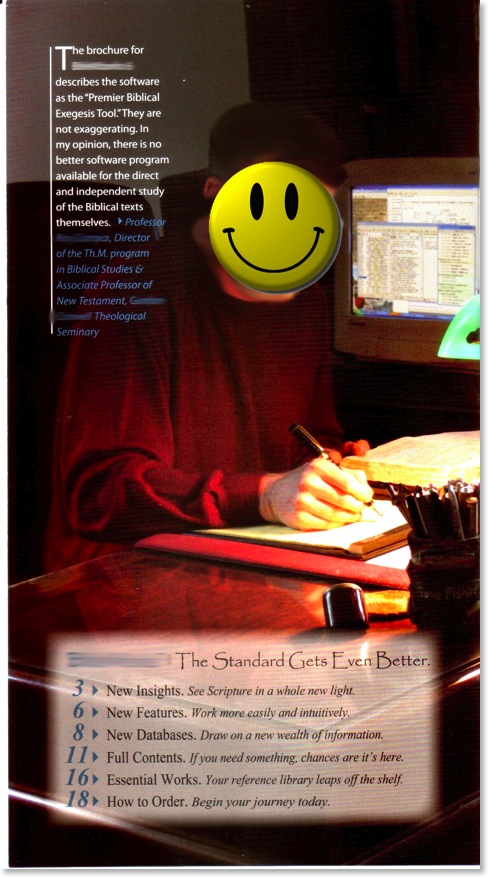
Before you read any further, think to yourself...What’s wrong with this picture (besides the smiley face and my other edits)?
If I were in charge of advertising Bible software, the above photograph is the exact opposite of what I’d want to represent in a brochure. Notice that the professor is concentrating not on [unnamed Windows Bible software], but instead he’s using a physical Bible and he’s taking notes on a legal pad--very old school, very non-Tech. Meanwhile, [unnamed Windows Bible software] is relegated--unfocused and at the moment, unused--to the background.
Now, I’m sure lots of people actually work this way. Sometimes I have a notepad handy when I work for quick notes or outlines, but I generally compose directly on the computer. And it’s not unusual for me to have a physical biblical text in front of me while I’m using Accordance. But that’s different. Why? Because this is an advertisement for software, for the love of Margaret! But the ad doesn’t focus on the software; it focuses on the way we studied before we had software!
Surely whatever Bible the professor in the picture is using would also be found in [unnamed Windows Bible software]. The brochure boasts 115 translations in 35 languages! And ten years ago when I used [unnamed Windows Bible software] before switching to the Mac and Accordance, I distinctly remember that the program had a very handy text editor included, so I’d toss the notepad for sure
I will say, however, that he’s sitting at a very attractive desk; and I certainly like the banker’s lamp...
What Is It with Apple and Grammar?
When I was in high school, none of my teachers would have allowed me to use the sentence above from Apple’s newest iPod touch campaign.
Technically, there are at least two problems with the ad. First, the period implies that the text is more than a label or description, but rather an actual sentence. Yet, if I were grading a paper and saw this exact text, I would label it an “incomplete sentence.” Of course advertisers regularly add periods to text such as this to give a description a sense of finality. Essentially this is shorthand for saying “[This iPod is] the funnest iPod ever.”
Second, there’s a problem with the word funnest, which technically isn’t a word at all. According to traditional English language rules, funner and funnest are not words. If a writer wants to use a comparative or superlative form of fun, correct usage dictates the selection of more fun and most fun, respectively.
Of course, using either of the correct forms makes for awkward advertising copy:
The most fun iPod ever.
or more correct:
This iPod is the most fun iPod ever.
or perhaps Apple could have just said
My new iPod is a lot more fun than your old iPod.
Okay, I can see where correct grammar doesn’t always make for good advertising. And I also have to assume that Apple’s advertisers aren’t uneducated, and they fully realize they are breaking the rules of good usage. Since Apple Macintosh computers come with a software dictionary based upon The New Oxford American Dictionary, I had to wonder what Apple’s own software would say about using the word funnest.

Well, according to Apple’s own internal dictionary, the usage for the word fun may indeed be changing. Note the last sentence: “The adjectival forms funner and funnest have not ‘arrived’ in all the dictionaries, however, and if employed at all, they should be used sparingly and not in formal written English.” Okay, fair enough. Advertising copy is not necessarily a formal context--at least not in regard to this advertisement.
When I teach writing classes, I strongly enforce the rules of grammar and usage because I feel that the parameters given in students’ textbooks offer a foundation for writing that can be modified later in appropriate contexts. I tell my students that great writers know when to bend the rules of grammar accordingly. For instance, Shakespeare regularly invented words when the glossary of his day didn’t express his intention (such as the adjective form of “alone,” lonely). Tolkien will occasionally use a double negative in The Lord of the Rings, but he does so with purpose in order to create a positive meaning from the combined words. A sentence like “It was a dark and stormy night” is not only cliched, but also begins with a pronoun lacking an antecedent. Nevertheless, Madeleine L'Engle could begin A Wrinkle in Time with those very words because she knew what she was doing and was an established writer by the time she wrote that book.
Even Apple’s detractors usually admit that the company makes great products--often products that set the parameters of the playing field for their competitors. So, perhaps they can get away with phrasings that would quickly be marked off on one of my students’ papers. And this is not the first time Apple has been known to break grammatical rules. English teachers gritted their teeth over the “Think Different” campaign in the late nineties (think is a verb and would require the adverb differently, not the adjective different).

Nevertheless, if you are one of my students reading this, stay away from funnest or I’ll mark it accordingly!
Do We Still Remember Christian Martyrs?
So you can only imagine my surprise at what I heard in a New Testament Intro class I was teaching last night. As my students were giving group presentations, the student speaking made what was essentially an aside comment in reference to Stephen, the first Christian martyr,
“You might feel it’s odd to think of a Christian martyr. Usually we only hear of Islamic martyrs.”
Such a statement not only reveals a serious lack of knowledge of Christian history, but also a misunderstanding of the word martyr (I’m sorry, but if you take others with you, you’re not a martyr--you’re just a sycophantic coward).
So, I wonder just how widespread this misunderstanding would be in our culture today?
And how did we get to this point?
What of Renovaré?
Since the book has been so good, I thought I might pursue some of his other writings as well as some of his associates in the Renovaré movement. I read Richard Foster’s Celebration of Discipline in 1991 when it was required reading in a Spiritual Formations class, but because it was an assignment, and because there was no follow-up to what we read, it never really had life changing impact upon me. Certainly I’ve looked to that book and some of Foster’s other writings when I occasionally taught on a subject that touched on spiritual disciplines, but I’ve had very little interaction otherwise.
I also just read “A Life Formed in the Spirit,” an interview with Foster in the current (September) issue of Christianity Today. That’s the kind of interview that makes me hungry for more. [And I also hope one day to have a job that allows a cool ponytail like Richard Foster, although Kathy says she won’t allow it.]
So, readers of This Lamp, in all seriousness, what are your thoughts on Renovaré and the attached personalities? Has anyone ever been part of a Renovaré small group, and if so, what is your evaluation? Does anyone have the Renovaré Spiritual Formations Bible? When I look at the Renovaré website, there are so many resources, I wouldn’t even know a good place to jump in. What would you suggest?
I welcome your insights and thoughts.
TNIV Gatekeeper Profiles, Part 1
Note: There are still two winners who haven’t responded to my email that I sent a few days ago. If you haven’t responded please do so soon. If you didn’t receive my email, let me know as well.
Kevin Womack
Pastor, Fletcher Hills Presbyterian Church
El Cajon, California
I first discovered the TNIV right before the first New Testament edition was released. I was just finishing up my Master of Divinity degree at Bethel Seminary's San Diego campus. Dr. Mark Strauss, New Testament professor there, had done some work on the new translation and gave a few presentations about it to anyone who was interested. Since the TNIV's release had been surrounded by a bit of controversy (gender-neutral issues, singular "they" issues, even accusations of the use of "father/mother" God) I was interested in learning more about it from a scholar I knew and trusted.
Mark's presentation was convincing enough for me to start reading the TNIV alongside my long-trusted NIV. At first I would simply reference the TNIV's more accurate and understandable rendering of a passage during my teaching and preaching. But, it didn't take long for me to begin preparing my sermons and classes primarily from the TNIV. In my opinion, it's simply a better translation (how I wish that the translators would have gone with their original plan of releasing this as the revised NIV... think of the controversy that could have been avoided!).
I've found myself incredibly frustrated by the attacks that have been launched against this translation, mainly because the majority of those attacks are waged by folks who haven't even read the TNIV. If they had, they'd know that what they were saying wasn't true. I have been challenged by a few of the honest, academic critiques but still feel that the TNIV is the most accurate and accessible translation currently available.
When I first began to use the TNIV I served as an Associate Pastor at a Presbyterian Church in downtown San Diego. About five years ago I became the Senior Pastor of Fletcher Hills Presbyterian Church in East County San Diego. I preach 40 Sundays a year and teach another 20-30 times each year (not counting the regular smattering of devotions and other informal teaching occasions) and I use the TNIV for all of my teaching and preaching. Of course, I study a number of different translations as I prepare, but I always use the TNIV as the text I read and preach from in the pulpit.
Members and visitors to our church ask on a pretty regular basis which translation I'm using. For many, they're following along in the NIV and wonder if I'm just a poor reader (since I always seem to "miss" words as I read and add others when compared to their NIV texts!). Others are looking to purchase a new Bible and want to know what their pastor recommends. I always recommend the TNIV because I believe it is the most accurate of the more accessible translations currently available. If they're asking about what to buy their children, I recommend the same unless the child is earlier elementary age in which case I recommend the NIrV (another excellent translation).
I'm thankful to Zondervan for publishing this translation. I'm looking forward to seeing more editions of the TNIV that feature paper that's a bit thicker for folks like me who enjoy to highlight in their Bibles and take extensive notes. I'm very grateful for the free TNIV Reference Bible that will be sent to me. It will receive extensive use!
Dan Thompson
Pastor of an Assembly of God Church in Minneapolis, Minnesota.
I have pastored Assemblies of God churches for 20 years. We have used the TNIV as our primary text for about two years. We read from a common text every week and the TNIV is our translation of choice. I actually ran an experiment of sorts when I was deciding on which translation to use. I used the TNIV for a month, then another translation for a month. We have different readers each Sunday.
I noticed the TNIV went much smoother in public reading than the other translation. I have stayed with the TNIV since that time.
I was not a fan of the NIV, but after hearing Gordon Fee give his views of the translation process for the TNIV, I decided to look again. For one, I like the gender inclusive position it carefully takes. For another, the small passages that had needed work in the NIV did get work in the TNIV and the small differences were good to see.
I love the TNIV reference Bible because it is finally a "regular" Bible for "regular" guys like me who just want a basic leather Bible with plenty of room for notes. Okay, it doesn't have plenty of room for notes, but at least it's a decent size without funky colors. Thanks you Zondervan.
The new Bible with an even better cover would be well used for years to come. Thank you for the opportunity to win a free Bible that I guarantee will be well used. As proof, I will be willing to send photos of my new Bible's interior every few months to show how I am getting it marked up!
Feel free to interact with Kevin and Dan in the comments.
Other Posts:
Part 2
Part 3
THIS JUST IN: A Remaining Renaissance Fine Leather TNIV Reference Bible
That means that if you meet the criteria as outlined at the original post, this tenth copy could be yours. You’ll need to respond to THIS post, not the original.
Be quick.
Understanding Matthew 5:28 [updated]
Look up Matthew 5:28 in your own Bible before reading further. There’s a reason I’m not going to quote the verse yet either in my own translation or a Bible version. What I intend to demonstrate below is that some translations get this verse right and some do not--and the results may surprise many readers of This Lamp.

I try not to commit a deliberate sin. I recognize that I'm going to do it anyhow, because I'm human and I'm tempted. And Christ set some almost impossible standards for us. Christ said, “I tell you that anyone who looks on a woman with lust has in his heart already committed adultery.” ... I've looked on a lot of women with lust. I've committed adultery in my heart many times. This is something that God recognizes I will do--and I have done it--and God forgives me for it.
Note that Carter seemingly distinguishes between what he calls “deliberate sin” from this sin of adultery in his heart which he calls an “almost impossible standard.” Why is it an impossible standard? It’s difficult because fleeting thoughts pass through our minds, often without invitation. Whether these uninvited mental visitors are shunned or become welcomed guests is a separate but related matter. But what if I told you that Carter may have unnecessarily struggled with the belief that he was committing “adultery in his heart,” when he may not have been? What if many of us have struggled, confusing the temptation with the actual sin, simply because we were using a Bible with poor translation of this verse?
Understand in what follows, I am not advocating lessening what God calls sin in any degree. Rather, we need to be sure that we understand sin to be what it is and be careful not to add restrictions that the Bible never speaks of. And if we misunderstand sin because of translation of the text, then the translations need to be changed.
This was brought to my attention while reading the book (technically, I’m listening to the 18-hour unabridged audio version) The Divine Conspiracy by Dallas Willard. In part of the book (which I highly recommend in spite of an error I’ll explain in a moment), Willard offers a skillfully written exegesis of the Sermon on the Mount. He spends quite a bit of time on Matt 5:27-28 explaining the exact nature of Jesus’ words. On p. 165, Willard writes:
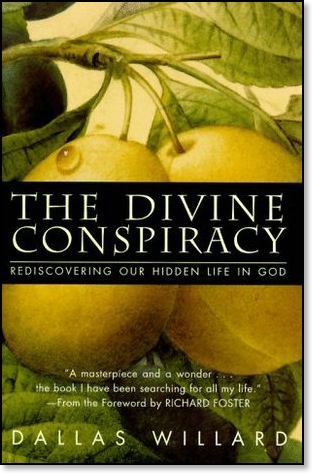
Therefore those translations of Matt 5:28 that say, “Everyone who looks at a woman and desires her,” or “everyone who looks at a woman with desire,” are terribly mistaken. They do much harm, especially to young people. For they totally change the meaning of the text and present “adultery in the heart” as something one cannot avoid, as something that just happens to people with no collusion of their will.
That on this reading to be tempted would be to sin should have been enough, by itself, to show that such translations are mistaken. No translation of scripture can be correct that contradicts the basic principles of biblical teaching as a whole.
The terminology of 5:28 is quite clear if we will but attend to it, and many translations do get it right. The Greek preposition pros and the dative case are used here. The wording refers to looking t a woman with the purpose of desiring her. That is, we desire to desire. We indulge and cultivate desiring because we enjoy fantasizing about sex with the one seen. Desiring sex is the purpose for which we are looking.
What Willard writes above makes sense on both a theological and practical level. However, in looking at the text itself, I had only one problem: I couldn’t find πρός/pros with a dative in Matt 5:28--
ἐγὼ δὲ λέγω ὑμῖν ὅτι πᾶς ὁ βλέπων γυναῖκα πρὸς τὸ ἐπιθυμῆσαι αὐτὴν ἤδη ἐμοίχευσεν αὐτὴν ἐν τῇ καρδίᾳ αὐτοῦ.
The Greek word πρός/pros is a preposition initially defined in the BDAG lexicon as “expressing direction ‘on the side of’, ‘in the direction of’: w. gen. ‘from’, dat. ‘at’, or acc. (the most freq. usage in our lit.) ‘to.’” In Matt 5:28 πρός/pros relates to ἐπιθυμέω/epithumeo (translated as lust or sexual desire or simply desire in English translations). But, contrary to Willard, ἐπιθυμέω/epithumeo is not a dative. In fact, it’s an infinitive in the aorist tense. At the end of the verse, there’s a dative--καρδίᾳ/kardia (heart)--but no amount of creative sentence diagramming is going to relate πρός/pros to καρδίᾳ/kardia.
I emailed two folks about this issue: Wayne Leman, Bible translator extraordinaire and my original Greek teacher from 1992, Darrell Pursiful. I asked them both if I was simply missing something that was staring me in the face. But they confirmed what seems abundantly clear simply by looking at the text: πρός/pros is not with a dative in Matt 5:28. So is Willard simply wrong in regard to his whole argument, especially with what he said in the second paragraph I quoted above?
Well, by the time I emailed Darrell Pursiful, I had already confirmed Willard’s basic thesis in a couple of other sources, and Darrell affirmed what I had found.
My first hunch had simply been to look at commentaries on Matthew. But in the brief survey of five or six volumes, including some fairly technical resources such as the ICC and Word series, none really touched directly upon this issue. Looking in Accordance, I pulled up The New Linguistic and Exegetical Key to the Greek New Testament. Here it was mentioned in reference to this verse that πρός/pros with the infinitive often expresses purpose.
I hit the Greek grammars, but did not find anything specific to this issue in Wallace or even basic grammars like Mounce. However, I did find what I was looking for in A. T. Robertson’s big grammar (once again proving that this grammar has never fully been “replaced” by any newer work). On p. 1003, Robertson writes, “In Mt. 5:28, πρὸς τὸ ἐπιθυμῆσαι, either purpose or result is possible.” And on p. 1075, Robertson writes that the idiom πρὸς τό “was used by the ancients in much the same sense as εἰς τό and ἐπὶ τῷ, ‘looking to,’with a view to.’”
Darrell also pointed me to Robert Guelich’s book on the Sermon on the Mount, which although I had on my shelf, I had failed to look at when searching commentaries. Sure enough, Guelich writes on pp. 193-194:
The phrase τὸ ἐπιθυμῆσαι αὐτὴν means literally “in order to desire having her (sexually).” The same very to desire to have (ἐπιθυμέω ) appears in the tenth commandment for “to covet” (Exo 20:17, LXX, and Deut 5:21, LXX). “To lust” in English connotes accurately the sensual overtones but lacks the accompanying thought of possession inherent in ἐπιθυμῆσαι.
So, what this comes down to is that Willard’s basic point is right even if he messed up his argument from the original languages. I can give him the benefit of the doubt that perhaps he may have simply had a brief mental lapse and it wasn’t caught at time of publication. I have a print copy of the book as well which contains the same error (I reproduced his argument above using it), but I don’t know if more recent printings have corrected the mistake.
What this means on a practical level is that Jesus never said “looking at a woman with lust” was sinful, but rather “looking at a woman TO lust” or “looking at a woman FOR THE PURPOSE of lust” is equivalent to adultery in the heart. That is, the actual sin is found in looking at a woman with express purpose to lust after her or even possess her as Guelich points out. Jimmy Carter, myself, and perhaps even you have stressed over the passing thoughts, the temptations, thinking we had sinned when this was not the case. Certainly entertaining those thoughts, that second and perhaps third glance invited sin, but not the initial look and thought that goes through our minds. We always have the option of quickly looking away (or simply changing our Yahoo profile).
So here’s where it gets interesting: which translations get it right and which ones get it wrong?
I’m not going to even quote the ones that get it wrong. You can look them up for yourself, but here they are: TEV/GNT, REB, NRSV, CEV, NASB (1995 edition), NLT1, and NLTse.
The wording in the RSV, NIV, NJB, Message, and TNIV draws a middle ground (some form of “look lustfully” ), but are still not as explicit in regard to purpose and intent as the translations below which better reflect the meaning of Jesus’ words.
Here are the translations that more accurately render the purposeful intent in Jesus’ words:
“ego autem dico vobis quoniam omnis qui viderit mulierem ad concupiscendum eam iam moechatus est eam in corde suo” (Vulgate)
“But I say unto you, That whosoever looketh on a woman to lust after her hath committed adultery with her already in his heart.” (KJV)
"Pero yo os digo que cualquiera que mira a una mujer para codiciarla, ya adulteró con ella en su corazón." (Reina-Valera)
“but I say to you, that everyone who looks on a woman to lust for her has committed adultery with her already in his heart.” (NASB, 1971 edition)
“But I say to you that whoever looks at a woman to lust for her has already committed adultery with her in his heart.” (NKJV)
“But I say to you that everyone who looks at a woman with lustful intent has already committed adultery with her in his heart.” (ESV)
“But I tell you, everyone who looks at a woman to lust for her has already committed adultery with her in his heart.” (HCSB)
“But I say to you that whoever looks at a woman to desire her has already committed adultery with her in his heart.” (NET)
Sources referenced:
Danker, Fredrick William, William Arndt, Walter Bauer, and F. W. Gingrich. A Greek-English Lexicon of the New Testament and Other Early Christian Literature. Chicago: University Of Chicago Press, 2000. [Accordance edition used]
Guelich, Robert. The Sermon on the Mount: A Foundation for Understanding. Dallas: Word Publishing, 1982.
Robertson, A. T. A Grammar of the Greek New Testament in the Light of Historical Research. Nashville: Broadman Press, 1934. [Accordance edition used]
Rogers Jr., Cleon L., and Cleon L. Rogers III. The New Linguistic and Exegetical Key to the Greek New Testament. Grand Rapids: Zondervan, 1998. [Accordance edition used]
Willard, Dallas. The Divine Conspiracy: Rediscovering Our Hidden Life in God. San Francisco: HarperCollins, 1998.
Feel free to offer your thoughts in the comments (just not your lustful thoughts).













